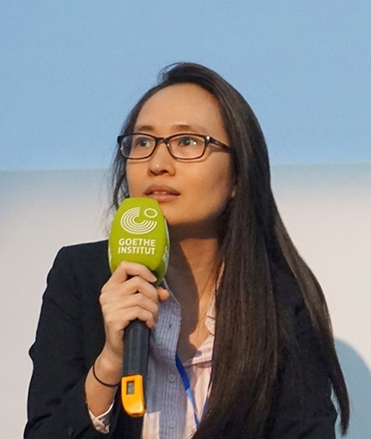The Emissary: Cemetery of Words
Nguyen Thi Hanh Quyen(Vietnam)
 Compared to the famous names of contemporary writers such as Murakami Haruki, or more popular writers such as Yoshimoto Banana, Higashino Keigo, or more advanced writers such as Kawabata Yasunari and Mishima Yukio, Tawada Yoko in Vietnam is in a relatively modest position. Her only novel that has been translated into Vietnamese is The Naked Eye, published in 2011, without a buzz and fading into oblivion. The arrival of the Vietnamese translation in 2023 promises to provoke discussion and reception of Yoko Tawada, who I personally consider the most unique and interesting writer in Japanese literature today.
Compared to the famous names of contemporary writers such as Murakami Haruki, or more popular writers such as Yoshimoto Banana, Higashino Keigo, or more advanced writers such as Kawabata Yasunari and Mishima Yukio, Tawada Yoko in Vietnam is in a relatively modest position. Her only novel that has been translated into Vietnamese is The Naked Eye, published in 2011, without a buzz and fading into oblivion. The arrival of the Vietnamese translation in 2023 promises to provoke discussion and reception of Yoko Tawada, who I personally consider the most unique and interesting writer in Japanese literature today.
Born in Tokyo in 1960, majoring in Russian literature at Waseda University, moving to Hamburg at the age of 22 and settling permanently in Germany ever since, Tawada is one of the few writers who now writes in both languages, Japanese and German, with great success in both. She singlehandedly collected the important prizes of the two literatures.
My favorite Tawada's short novel, written in Japanese, was published in 2014, inspired not only by Japan's aging population, but also directly from the Fukushima nuclear disaster that Tawada has personally visited several times since 2011. While the elderly are immune to nuclear poisoning, children are affected. A story of "Japan's isolation," as Tawada himself puts it, where the elderly continue to live without dying, and children are born sick, where the only surviving wildlife are crows and spiders, where all technology is gone, The Emissary is part of another series of science fiction compositions depicting a dystopian Japan.
At the center of the story is an old man who is over a hundred years old, but still extremely strong, the writer Yoshiro, who takes care of his great-grandson Mumei, meaning Unknown. Their daily activities are depicted with details that create a background for the reader to imagine a fantasy world where Tokyo is now a poisoned city, fresh food is scarce, and parts of Japan seem cut off from the outside world no more trade.
The hope now rests with the registries, children selected to be sent abroad for research in hopes of rehabilitating future generations.
But it is precisely in the novel that imagines as a new experiment in the genre that readers encounter familiar motifs of the writer writing in and crossing the lines of these languages: the incarnation and the influential process of losing and finding identity from Franz Kafka, the play with language, and the decline of a vision of the stable existence of the world.
Considering that the person who helped him know the beautiful language of writing was German thanks to Kafka, Tawada did not miss an opportunity to pay tribute to the most famous German writer of the 20th century by going back and forth with the motif of characters transforming into animals and telling stories from an animal perspective.
In The Emissary, the image that catches the reader's eye in the first paragraph depicts the boy Mumei as a young bird. Mumei was born to a mother as beautiful as a crane, who when she died turned into a bird, as a child had weak legs, and liked earthworms rather than milk. As Samsa turns into a giant bug overnight and stumbles on his uncontrollable pile of swinging legs, Mumei struggles with his legs as he undresses, where he visualizes himself with eight legs like an octopus.
Is Mumei's continuous incarnation from man to bird to sea creature a counter-evolutionary process, an allegory for both searching and losing identity, the process of being lost by an individual as a light on the disorientation of an entire nation, people..
How to read from that distorted metaphor is what makes an open-ended text by Tawada, who has always been highly conscious of fiddling with language. What is particularly interesting in The Emissary is the prohibition on the use of foreign words that make people struggle to find alternative words, and by a series of ingenious word games, Tawada lays out the difficulties of the living to avoid as much as possible the words that have been publicly crucified..
Although located in a context of environmental destruction, the gloomy tone is not the dominant theme of the Constitution. The great-grandfather's love for grandchildren, the warmth and sympathy, the sorrow and helplessness of an elderly person caring for a young person who is extremely understanding, create a sparkle for the work. More than ever, readers feel the precariousness of a world that thinks it will be stable for a long time, but if only an unpredictable catastrophe, everything we have known for a long time, dissolves in the blink of an eye.
(Translator and Founder of “Zzz Review”)
